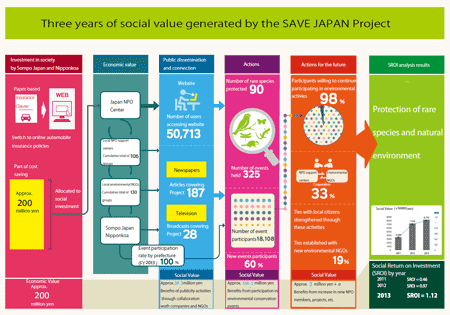Social Value of Environmental Conservation Program Calculated for First Time in Japan Visualizing the results of three years of "SAVE JAPAN Project" activities
July 2, 2014
Sompo Japan Insurance Inc.
Nipponkoa Insurance Co., Ltd.
Sompo Japan Insurance Inc.(President: Kengo Sakurada; hereinafter, “Sompo Japan”) and Nipponkoa Insurance Co., Ltd. (President: Masaya Futamiya; hereinafter, “Nipponkoa”), have joined with the Public Management and Social Strategy Institute Inc. (President: Ichiro Tsukamoto, Professor, School of Business Administration, Meiji University) and Social Impact Research Co., Ltd. (representative partner: Taku Kumazawa) in utilizing social return on investment (“SROI”) analysis* to calculate the social value of the biodiversity conservation activities conducted by the “SAVE JAPAN Project.” This marks the first time in Japan that SROI analysis has been used to evaluate social value in the area of biodiversity conservation. Even in the UK, where social value assessments are regularly made, there appear to be almost no case example of SROI analyses with regard to biodiversity conservation activities which highlight our case as one of the prescient analysis even in a global context.
- *An assessment method focusing on social value rather than economic value. A project’s effectiveness is measured by comparing the social value generated by the project with the expenses required to generate that social value.
Social return on investment (SROI) = social value generated / expenses required
- Overview of the “SAVE JAPAN Project”
The SAVE JAPAN Project is a program in which we make donations to environmental NGOs and other organizations that correspond with the number of customers who decide to select the “web-based insurance clause” option when enrolling in automobile insurance. It carries out activities to conserve biodiversity towards citizens in cooperation with the Japan NPO Center, the NPO support centers that support civic activities in local regions, and environmental NGOs nationwide.
A cumulative total of 325 events were held during a three-year period starting from FY2011, with more than 18,000 local citizens participating.
The project provides opportunities for citizens to rethink their local natural environment and aims to “create livable environments for living creatures” by promoting activities for environmental conservation through the cooperation of companies, NGOs, and citizens.
- SROI analysis results for the “SAVE JAPAN Project”
The purpose of this project is to provide citizens with opportunities to participate in environmental conservation activities. This analysis endeavored to monetize the social value of the project as a whole, by considering in its calculations not only the primary outcomes of citizen participation in environmental conservation events but also secondary gains including the publicity effect stemming from the project and increasing numbers of new joining members of NGOs.
The results showed that the SROI for the “SAVE JAPAN Project” improved from FY2011 to FY2013, with FY2013’s SROI reaches to 1.12 showing the fact that generated social value were exceeded the cost of investments.
The ultimate objective of this project is the protection of rare species and since it cannot be achieved by hosting environmental conservation events in a short-term perspective, our primary focus is on raising public awareness of the necessity for biodiversity conservation and encouraging public participation in environmental conservation activities in a long-term perspective. Since the affect of pertaining to the protection of rare species were not considered as direct benefits in this analysis, the results does not represent the social value as a whole..
For more details: please see the “SAVE JAPAN Project SROI Assessment Report” posted at the following links (Japanese Only).
- Future Developments
The results of this SROI analysis will be shared with environmental NGOs and other stakeholders and utilized as a tool for continual improvement of the programs in a sustained effort to help “create a livable environment for living things.”
Figure: Social Value of “SAVE JAPAN Project”
